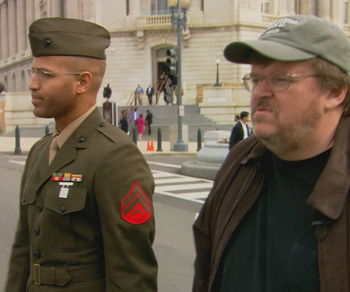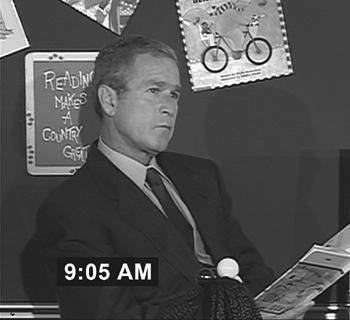![[Metroactive Movies]](/movies/gifs/movies468.gif)
[ Movies Index | Show Times | Santa Cruz Week | SantaCruz Home | Archives ]
Face Time: This scene is one of the few in 'Fahrenheit 9/11' in which Michael Moore actually appears.
The Fire This Time, Part Two
The second of a two-part series taking a deeper look at the artistic and commercial success of 'Fahrenheit 9/11' and the hell-raising career of Michael Moore
By Geoffrey Dunn
Little more than a year after his Oscar triumph, Michael Moore is now back in the cinematic limelight with Fahrenheit 9/11. Barely into its theatrical run, the buzz of publicity over the last few months has turned into a democratic roar.
Without giving too much of the film away, I think it's safe to say that Bush did it. There's little suspense about that in the film. But Moore does build his case against Bush into an incendiary crescendo by the time the credits roll.
The film opens with a rehash of the "stealing" of the 2000 presidential election and the vote-counting debacle in Florida. It's familiar terrain that's been covered before. Indeed, we saw it happen before our very eyes, watched it on the networks and CNN and whatever cable channel we happened to surf onto.
But when Moore juxtaposes archival network coverage of the contested election with an airplane interview with Bush in which the then-candidate emphatically declares, "We are gonna win Florida; write it down!" one can't escape being sickened by the realization that the fix was in from the get-go.
Then Moore cuts to none other than the defeated Al Gore, in his capacity as president of the Senate, presiding over the ratification of the 2000 election. As several Asian American and African American members of Congress attempt to protest the results of the stolen election, a cardboard Gore gavels them to silence because not a single member of the Senate would sign their protest. My anger at that point was bipartisan.
This early dig at Gore (whom Moore did not support in 2000; he supported Nader) and the Senate Democrats, I believe, lends an air of credibility to the film that it wouldn't otherwise have. It's as if Moore is signaling to his audience that his moral outrage crosses party lines. In my mind, it makes what follows all the more powerful.
What's fascinating about Fahrenheit 9/11 is that little, if any, of the "revelations" in the film are new. Indeed, most of them are covered in Moore's Dude, Where's My Country?, particularly in its opening chapter, "Seven Questions for George of Arabia," replete with 97 footnotes. It's also covered in far more depth in House of Bush, House of Saud, by Craig Unger, who's interviewed in the film.
But it's one thing to read about the Bush family's cozy financial links to the Saudi government and the bin Laden family (Unger asserts that they have enriched Bush and his family associates with $1.4 billion), and it's another to see so many news clips and photos of the Bushes and their Saudi cronies cavorting together.
Then there's the footage of President W on the fateful morning of Sept. 11, 2001. To me, this is the sequence that does in Bush; and it's the one that Bush and Co. cannot dismiss or question the authenticity of.
Bush was in his brother's domain of Florida, on his way to an elementary school photo-op, when he was informed of the first plane crash into the World Trade Center; he continued to the school. He was in the middle of reading My Pet Goat to the students when an aid walked in and informed him of the second attack.
Moore got footage of Bush's visit to the school from a teacher. Contrary to the official line that Bush left immediately following news of the second attack, the clip reveals that Bush stayed for an additional seven minutes--the vapid, muddled look on his face is absolutely alarming, given the seriousness of the events--before he got up to leave, not on his own initiative, but at the suggestion of another staff member.
The footage is indelible.
Perhaps the most haunting images from the film (cut very similarly to the opening sequence of Errol Morris' Fog of War) are those of the überbrokers of the Bush administration--Donald Rumsfeld, Dick Cheney, John Ashcroft, Paul Wolfowitz, Colin Powell and Condoleezza Rice--having their hair primped and makeup applied in slow motion as they await appearances on television. (Wolfowitz actually sticks a comb in his mouth to wet his hair, then spits on it again before the camera.) The sequence made my skin crawl.
This is, of course, the power of documentary film--the sense of experiencing actuality firsthand.
There is a bond, or an assumption, in documentary construction between the filmmaker and his or her audience that what's being seen on the screen, while edited and constructed, is largely unmediated. The power of documentary is lost when that bond is broken. Moore has broken it in several of his other works. Not so in Fahrenheit 9/11.
Nor does Moore go in for his traditional cheap shots in 9/11. His sarcasm is more subtle, his humor more tempered. This is a serious film, and Moore fully respects the gravity. There's a little dig at Britney Spears (who really cares what she thinks about Bush?) and Moore reads excerpts of the Patriot Act over a loudspeaker from an ice cream truck, but Moore's often troubling trademark shtick is kept to a minimum. He lets the images themselves make their case.
Closing the Gap
The ultimate question on everyone's mind in the days leading up to the release of Fahrenheit 9/11 was: How good of a case does it make? Will it be compelling enough to impel American voters to throw George W. Bush out of office?
Many of my friends on the Democratic left view Moore with suspicion. They were angered by his support of Nader in 2000, and they are none too happy that he has yet to support John Kerry. (I suspect Moore is waiting to do so for theatrical effect, but who knows, Kerry's Brahmin background may be too much for him.)
Conversely, many of my friends in the Green Party were outraged that Moore endorsed Wesley Clark in the Democratic primary. He did so, he declared, because he thought that Clark could beat Bush. In a matter of four years, Moore had gone from an idealistic Green to a peculiarly pragmatic Democrat. Go figure. But I would suspect that George W. Bush is at the heart of Moore's political alchemy.
Fahrenheit 9/11 does not, indeed, make the case for the election of John Kerry. That, I would argue, is Kerry's case to make, not Moore's. And I believe that much of the strength of 9/11's compelling brief against Bush comes from the fact that Moore did not endorse Kerry. It lets the audience come to its own conclusion.
One film, however, does not a campaign make. Please excuse the sports metaphor here, but if the election were a baseball game, I would say that Moore has issued a 95-mile fastball right at Bush's cowboy hat. And Bush will be spending a considerable amount of energy in the months ahead trying to get up from the dirt and regroup himself before the election.
But as anyone ever involved in politics knows, it's a long time between the Fourth of July and election day. A lot, as they say, can happen. Whether John Kerry captures the imagination of the American electorate will be up to him and the Democrats, not Michael Moore.
In the interim, I do not think that George W. had a good day the Friday this film opened. He could not have been a happy camper. There's more bad news coming out of Iraq and the theaters are full of newly motivated voters. Fahrenheit 9/11 was made with the clear intention of stripping him of his presidency, and I think that it will have a powerful impact on his fate.
The proof of that particular pudding, of course, will come in November.
Copyright © Metro Publishing Inc. Maintained by Boulevards New Media.
For more information about Santa Cruz, visit santacruz.com.
![]()

Photographs by Dog Eat Dog Films
In part one of this series, Geoffrey Dunn analyzed the commercial success of 'Fahrenheit 9/11' and put it into the context of Michael Moore's cultural impact from his early days at 'Mother Jones' up through his controversial Oscar acceptance speech.--Editor

The Lights Are On, But You're Not Home: The president's reaction to news of the World Trade Center attacks is one of the most disturbing scenes in 'Fahrenheit 9/11.'
Longtime Metro Santa Cruz contributor Geoffrey Dunn's latest film, 'Calypso Dreams' (co-produced with Michael Horne, Eric Thiermann and Mark Schwartz), was just honored by the United Nations' World Conference on Culture in São Paulo, Brazil.
From the July 7-14, 2004 issue of Metro Santa Cruz.